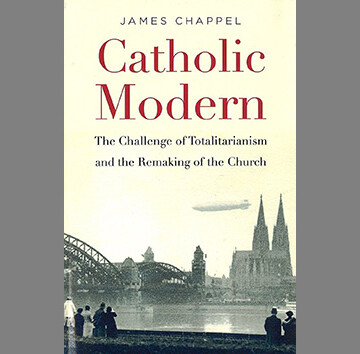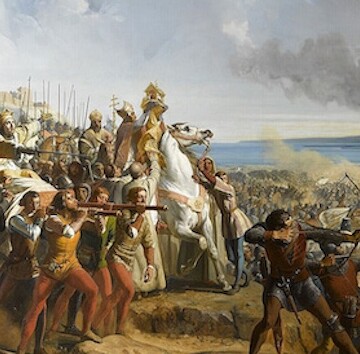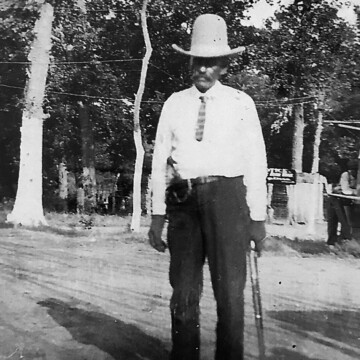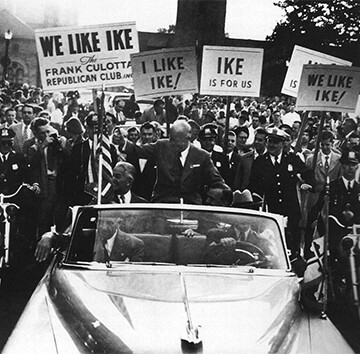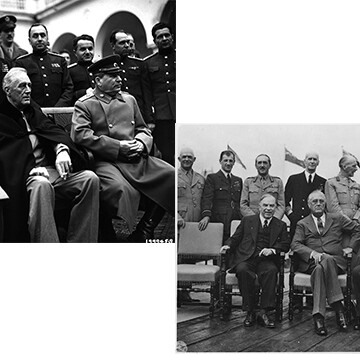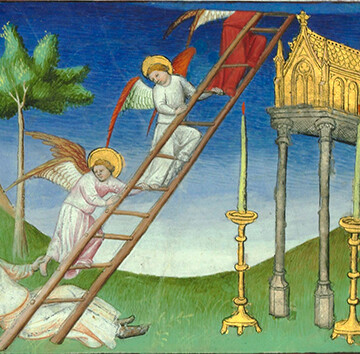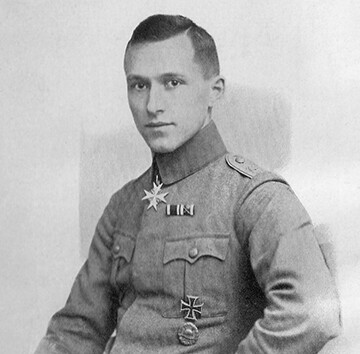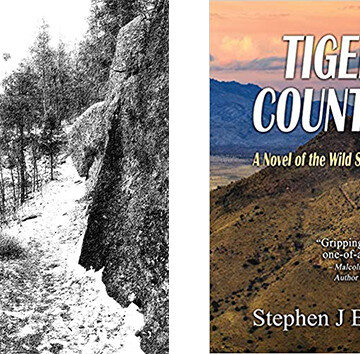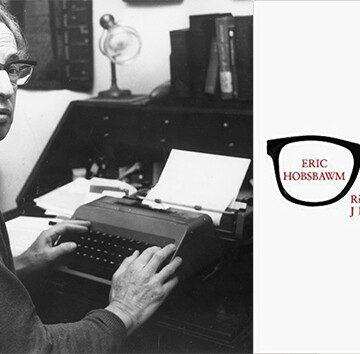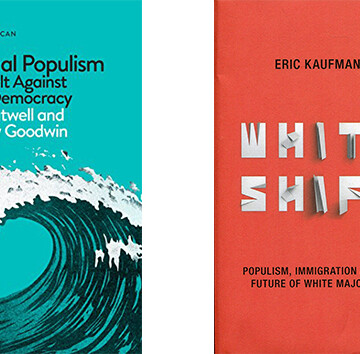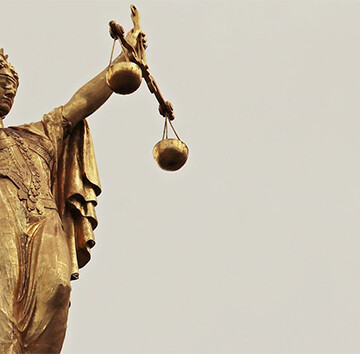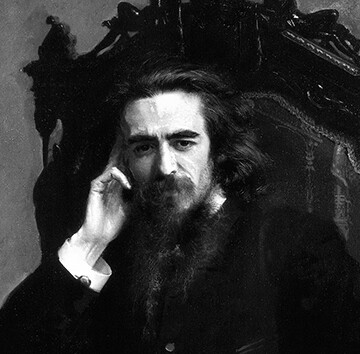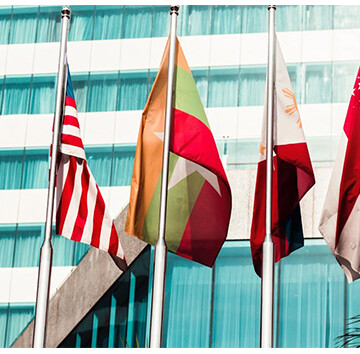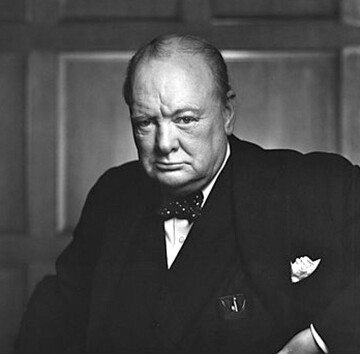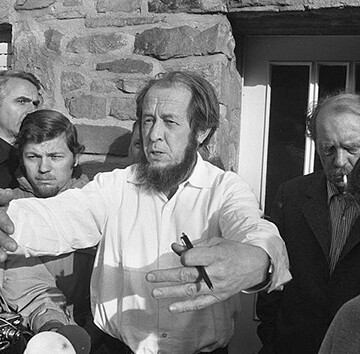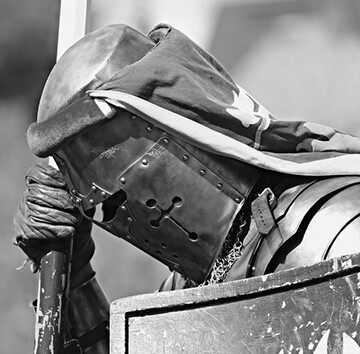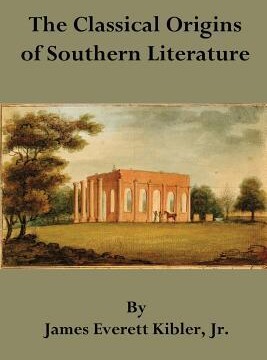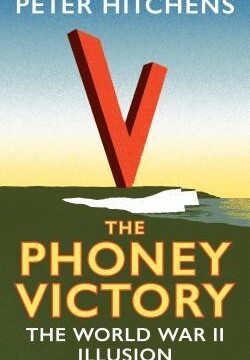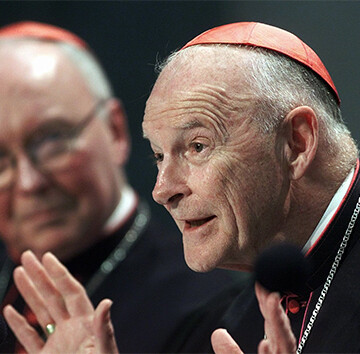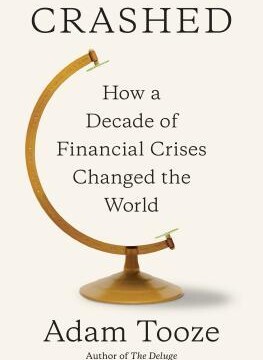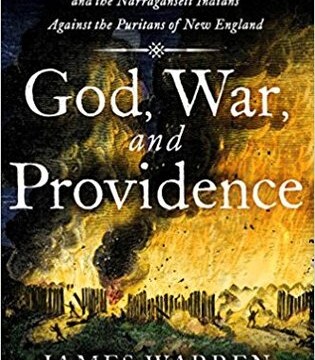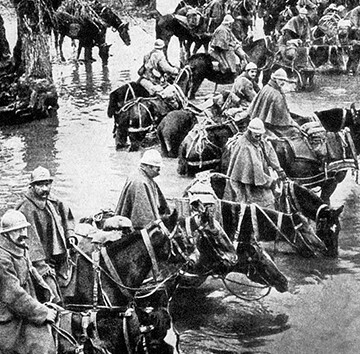Much has been written about the modernization of the Catholic Church—especially the crucial years from 1870 to 1970. These histories have been written from a number of perspectives, each with different definitions of modernity. James Chappel, assistant professor of history at Duke University, gives us a new interpretation which succeeds in revising some of these...
Category: Reviews
Emperor of Imagination
Charles the Great looms out of the swirling obscurity of post-Roman Europe like the Great Lighthouse of Alexandria, signaling simultaneously radical renewal and an alteration of everything that came before. As Janet Nelson illuminates in her new book, it is impossible to imagine the West without Charlemagne as figurative and literal progenitor. The King of...
The Crucible of Innovation
It is an inconvenient fact—and one studiously neglected by proponents of unrestricted global migration—that the main military participants in the politically incorrect and toxically masculine medieval Crusades were migrants. Nubian infantry, Egyptian cavalry, Armenian Turcopoles, European knights, and Turkic horsemen from the Eurasian steppes all migrated to the Levant during the High Middle Age period...
Spying on the American Remnant
As a boy, your author lived in a working-class neighborhood just outside Houston’s city limits. My parents were the children of rural people who had come to Houston looking for work during the Great Depression. They lived in frame houses sitting on cinder blocks in Houston’s West End, a community of people Larry McMurtry called...
Supreme Court’s Drifting Days Are Done
This scrupulously objective book may be considered a gift to conservatives who have long despaired about the possibility of principled legal tenets regularly prevailing in Supreme Court opinions. For decades this long-suffering group has watched Republican Supreme Court appointees concur in various left-wing crackpot decisions that have become the law of the land. Thankfully, such...
What the Editors Are Reading
Dostoevsky’s great 1866 novel Crime and Punishment reads like a frenetic vision. A compulsive gambler and one-time political radical who was condemned to Siberia and forced labor, Dostoevsky created the novel’s Rodion Raskolnikov, a half-mad dreamer who expressed the radical, nihilistic ideas of the time. Drawing on his own struggles and experiences, Dostoevsky used Raskolnikov...
Let Us Now Praise Famous G-Men
Over the past few years, the United States federal government attempted a coup d’état against its own chief executive. Working from “opposition research” paid for by Hillary Clinton and the Democratic Party, the Deep State and its partners in the media came within a hair’s breadth of taking down a sitting president. This was the...
Wake-Up Call to the Scared Bunnies
A MarketWatch story this summer let us in on why millennials stash so little cash in 401(k) accounts. Like, given climate change, what’s the point? “The weather systems are already off,” a woman named Lori Rodriguez told a MarketWatch reporter, “and I don’t think it’s hyperbolic to be a little apocalyptic.” A few days later,...
What the Editors Are Reading
I’m enmeshed in reading all of Shakespeare, using the The New Oxford Shakespeare: Modern Critical Edition (Oxford University Press, 2016). Within 3,180 pages, it contains all the Bard’s writing in chronological order, from The Two Gentlemen of Verona to The Two Noble Kinsmen, and everything in between, including his sonnets. This edition has a splendid...
We Ought to Like Ike
As a second-year West Point cadet in March 1969, I was returning to my room after chemistry class midafternoon on a Friday. As I stepped inside Pershing Barracks, I saw a number of cadets huddled around a note posted on the stairway railing. In neat penmanship were the words: “General Eisenhower died this morning.” Neither...
Republic of War
For a pacific, commercial republic protected by two giant oceans and two peaceful neighbors with small militaries, America sure has fought a lot of wars. Michael Beschloss’s Presidents of War details eight American leaders beginning in 1807 who took us to war and just one, Jefferson, who didn’t. The text wraps up after the Vietnam...
Books in Brief
Undocumented: A Dominican Boy’s Odyssey From a Homeless Shelter to the Ivy League, by Dan-el Padilla Peralta (New York: Penguin Books; 320 pp., $17.00). I read Dan-el Padilla Peralta’s memoir of his illegal residency in the United States last week while on vacation in Germany, another country arguing about immigration. The book answered several questions...
Against the Barbarians
The 21st century is a return to the Age of Walls. As historian and archeologist David Frye writes in his important new book, Walls: A History of Civilization in Blood and Brick, few have noticed that a new era of wall building is now upon us, driven by mass migration and Islamic terrorism. While the...
Unconscious Beauty
This handsome hardbound volume, an authoritative study in art history that can pass as a coffee-table book, is billed by its publisher as “the first-ever history of the representation of dreams in Western painting.” The author, Daniel Bergez, is himself a painter, and also a scholar, critic, and professor at the Lycée Henri-IV in Paris....
Books in Brief
The Wind from America, 1778-1781, by Claude Manceron (New York: Simon & Schuster; 584 pp.) In this second volume of the Age of the French Revolution series, first published in 1978, Manceron explores the influence on Europe of both American democratic thought and politics during the American Revolution and early nationalist periods. Manceron, a popular...
The Other Road to Serfdom
The World Trade Organization (WTO) has been criticized since its founding in 1995. Leftists claim that free trade places the Third World at a disadvantage, while President Donald Trump and paleo conservatives argue that some WTO policies threaten U.S. sovereignty. But what is the origin of the WTO and the neoliberal economic theory that underlies...
The War of Nihilisms
The first English translation of Ernst Jünger’s journals from the Second World War is a cause for celebration. The journals were like treasures stashed away in an old castle, behind a door that could be unlocked only if one learned to read German. It’s open now, and what’s inside are literary gems on every page....
College Admissions and Other Rites of Fragility
Think of the angst the recent college admissions scandal has caused in wealthy households from Greenwich to La Jolla, and nowhere in between, except maybe Winnetka. After speaking with friends navigating the modern-day rite of passage that applying to college has become, I imagine dinnertime conversations like this: “Sequoia? Sequoia, can you put down your...
Bodio’s Country
Stephen Bodio is a memoirist, journalist, critic, sportswriter, naturalist, outdoorsman, hunter, falconer, bird breeder, dog breeder, and now a novelist. Born in Boston, he has lived in the dusty roadside hamlet of Magdalena in southwestern New Mexico for more than 30 years and has published a dozen books, including the superb Querencia—the literary artist’s autobiographical...
Books In Brief
Twilight of the Elites: Prosperity, the Periphery, and the Future of France, by Christophe Guilluy (New Haven: Yale University Press; 184 pp., $25.00). The French dislike what they call “Anglo-American economics” even more than they dislike English and American cookery; also, more recently, progressive Anglo-American views regarding the supposed identicality between the sexes. Christophe Guilluy,...
What the Editors Are Reading
Always keen to read travel books about Mexico, I picked up an elderly copy (printed by A. Appleton & Company in 1921) of Viva Mexico! by Charles Macomb Flandrau that I came across in a local bookshop. The book, originally published in 1908, is still available in reprint. I’d never heard of Flandrau, but a...
Faithful Son
Boyd Cathey is an 11th generation Carolina Tar Heel who was mentored by and worked with Russell Kirk. The Land We Love: The South and Its Heritage is written reverentially, just as one might reflect on the memory of one’s mother. For the South is not just any region of the United States, like the...
An Understandable Curiosity
This is a massive biography of an economic historian whose popular fame rests on his having been made one of 65 Companions of Honour by the Queen while remaining a member of the Communist Party of Great Britain. It suffers from many of the difficulties encountered by biographers of men of thought. Like William Howard...
No Justice, No Peace
There is no pleasing Duke University law professor Brandon L. Garrett, author of the death-penalty-abolishment screed End of Its Rope: How Killing the Death Penalty Can Revive Criminal Justice, though much about the current state of criminal justice should please him. Nationwide, death sentences and executions are at historic lows, yet he claims that the...
What the Editors Are Reading
When I was in my middle teens I read all or most of Sinclair Lewis’s work. It seems impossible, but it is a fact nevertheless that Main Street will be a century old next year, and Babbitt in 2022. I took my copy of the latter from the shelf the other day (Signet Classic edition,...
Books In Brief
The Case for Trump, by Victor Davis Hanson (New York: Basic Books; 400 pp., $23.99). It is expected of an author that he say something new and big about someone or something new and big, even should it have been so for two years already. President Trump remains something new and big, though his detractors...
Replacement Theories
In 2004, Dutch political scientist Cas Mudde published The Populist Zeitgeist, an attempt to define the growingly important but haphazardly applied concept of “populism.” He had an emotional as well as an academic interest, because “far-right” nationalism had enmeshed his own brother. His influential conclusion was that populism was an unlikable “thin ideology,” almost infinitely...
The Long Apocalypse
Today, a century after the close of the “war to end all wars,” the prospect of achieving what the U.N. and other such garrulous bodies call “global peace” seems ever more remote. According to the Universal Declaration of Human Rights, if only we could establish everywhere the right to equality before the law, freedom of...
Books in Brief
The Life of Saul Bellow: Love and Strife, 1965-2005, by Zachary Leader (New York: Alfred A. Knopf; 784 pp., $40.00). This is the second volume of the author’s biography of Saul Bellow, a massive and no doubt definitive work, minutely researched and very well written. Nevertheless, the patience required of the reader to pursue such...
What the Editors Are Reading
I’m rereading large portions of Ed Abbey’s books (of course) as Chronicles goes to press: Desert Solitaire, Black Sun and The Fool’s Progress (both novels), Abbey’s Road, One Life at a Time, Please, Down the River, Beyond the Wall, The Journey Home . . . the record of a full, busy, and productive lifetime in...
From Such Turn Away
Dr. Daniel Mahoney, the Augustine Chair in Distinguished Scholarship at Assumption College, has written a most scholarly and challenging book, in which he argues that “humanitarianism” without grounding in faith is a danger to our civilization. This philosophy seeks to create a “new man” and produce a “new humanity,” with roots in Auguste Comte’s “religion...
Nationalism: More to Learn
However much they may enjoy watching Captain von Trapp sing “Edelweiss” in The Sound of Music, most Catholic intellectuals nowadays are squeamish about delving too deeply into the production’s historical background. Such reticence is hardly surprising, for in Von Trapp’s day Catholic Austria was led by Engelbert Dollfuss—a man deeply enthusiastic about his Germanic heritage,...
Chief of Men
Of the making of books about Churchill there is no end. The latest is the best to date. Andrew Roberts reduces Churchill’s epic life to some 1,100 pages, offering a précis of the great events in which he was involved while drawing on 40 new sources. These include the private diaries of King George VI...
The Iceberg Cometh
Throughout the Introduction and into the first chapter of Ship of Fools you seem to be seated before a television screen listening to, and watching, Tucker Carlson in his nightly broadcast. The voice is the same, the tone is the same; so is the manner. Then, almost imperceptibly, you find yourself slipping—or rather being slipped—from...
Glimpses Delightful and Rare
One of the root problems facing our beleaguered world is that many of our contemporaries are belaboring the past as a burden, believing that the legacy and traditions of Western Civilization are a millstone around modernity’s neck. Cast off the shackles of the past, with its outmoded morality and outdated way of doing things, and...
March On
What you might find on a long walk, a determined walk, a walk of exploration, you never know, of course, until you take the next step. And the next; and the next—in Rory Stewart’s case, across the constantly revelatory terrain of the borderlands shared since Roman times by England and Scotland. To what end? Do...
Displaced Persons
In an age of anti-elite anger, it might seem otiose to publish an academic analysis of aristocratic ideas in Western thought. But as the post-1945 order rattles itself to pieces, it is time to look past its bankrupted beliefs and discredited leaders for other guiding principles—principles based on history instead of ill-defined and naive hopes,...
The Faults of Woodward and Trump
There’s a lot of buncombe in Bob Woodward’s Fear: Trump in the White House. Doubtless Chronicles readers heard some of it when the book was released on September 13, as the mainstream media played and replayed on the hour reports of Chief of Staff John Kelly allegedly grousing in the author’s presence that Trump’s “an...
The Empty Plinth
With the Midterm Elections safely behind us, should we count on the left to renounce the fun of castigating nonleft types for their racism, sexism, and hetero normativism? Not on a bet. We’re at a new place in the world. I mean a world that, especially in its European components—this includes, naturally, us—has to widespread...
Out of Troy
Author of several novels and a memorable autobiographical work entitled Our Father’s Fields (1998), as well as a leading light of the Abbeville Institute, James Kibler has produced in the present work an indispensable study of the classical influence on Southern literature. Other literary historians and critics of Southern letters have explored this territory; however,...
The Fable of the Glorious
British journalist Peter Hitchens is a great controversialist. His most famous work remains his 1999 Abolition of Britain, which lamented the decline of Britain since the 1960’s, focusing particularly on the decay of morals and the rise of pop culture. Since then Hitchens has written books critical of numerous aspects of modern British society including...
Obama’s Pope
Mr. Neumayr’s comprehensive and exhaustive work, a fine example of investigative journalism, should deeply worry Catholics, laity and clerics alike. Jorge Mario Bergoglio is the first Latin-American pope in Catholicism’s centuries-long history. He is also, Neumayr quips, “the Pope they have been waiting for,” whose messages support Marxists and Marxism, shockingly unlike the statements issued...
Obsession!
Reading Ann Coulter’s newest polemical masterpiece brings to mind one of her previous ones. I don’t mean her sparkling In Trump We Trust, published just before the 2016 election (and reviewed in this magazine), in which she predicted that the unthinkable would happen. Rather I refer to her 2011 book, Demonic: How the Liberal Mob...
What Leads to What
Last fall, when they stopped in New York on their way to vacation in Europe, Chronicles editor Chilton Williamson and his wife invited Taki and me to dinner. Before the wine started flowing and Taki’s raconteurial skills became the primary entertainment, Chilton mentioned his desire for more reviews of books of economic history in the...
A Matter of Necessity
God, War, and Providence approaches the story of Roger Williams by exploring the relationship between Puritan Massachusetts and Williams’s Rhode Island, and the relations both colonies had with the Indian tribes inhabiting these regions. Plymouth Plantation was founded in 1620 by English Separatists. The plantation system had first been employed in Ireland to subjugate the...
Not Just Any Book
Two questions immediately suggest themselves regarding this work: Who was (or is) Pandora (and her box), and do we really need yet another book on World War I, detailing its causes, alliances, generals, battles—replete with maps, photos, charts and so forth? Yes, 2018 is the 100th anniversary of the war’s end (November 11, at 11:00...
“Yet Britain Set the World Ablaze . . . ”
David Cannadine launches Victorious Century by quoting Dickens: “It was the best of times, it was the worst of times, it was the age of wisdom, it was the age of foolishness, it was the epoch of belief, it was the epoch of incredulity, it was the season of Light, it was the season of...
What Really Happened
“You can observe a lot just by watching.” —Yogi Berra I call 2016 the Chronicles Election. The issues discussed in this magazine, often a lonely voice in the wilderness, for more than 30 years finally caught up with the national political discourse and got a president elected. They are bum trade deals, an eroding industrial...
What the Editors Are Reading
It’s easy in this business to read too much journalism at the expense of books. Every morning I go through the New York Times (faster and more selectively with each week that passes), the (London) Daily Telegraph, and Le Figaro (it has some strong conservative writers, like Luc Ferry, and interesting essays and well-done interviews...
Books in Brief
In 1935, as president of France, Pierre Laval banned “weapons of war” and decreed that all firearms should be registered with the government. In 1945 he was tried and found guilty of treason for his collaboration with the German occupation. Between those two years, Hitler built his strong war machine, and in 1940 he invaded...
